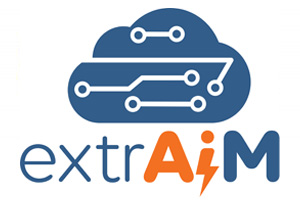DURATION: 20.01.2022- 19.01.2024
BUDGET: 149.636,00€/ 305.044,00€
FUNDING: AI4SCIENCE, European Space Agency (ESA)
ABOUT extrAIM
 extrAIM: AI-enhanced uncertainty quantification of satellite-derived hydroclimatic extremes, is a 2 year project, under the AI4SCIENCE call of European Space Agency (ESA).
extrAIM: AI-enhanced uncertainty quantification of satellite-derived hydroclimatic extremes, is a 2 year project, under the AI4SCIENCE call of European Space Agency (ESA).
extrAIM will develop a first-of-its-kind, satellite-based, low-latency, uncertainty-aware precipitation dataset for the Mediterranean region, adjusted to account for the extremes’ probabilistic behavior.
We combine statistical learning and Bayesian modelling methods (for uncertainty quantification) with an AI (Artificial Intelligence)-enhanced dataset integration approach, suitable for combining multiple precipitation products (e.g., satellite-data, estimates based on soil moisture), with special focus on model’s explainability.
Additionally, extrAIM will develop a web data-management and visualization service able to provide a easy access to the uncertainty-aware satellite-based datasets and communicate risks from individual and compound extreme events, aiming to increase understanding and awareness.
KEY OBJECTIVES
- The development of an AI-enhanced, yet explainable, approach to optimally combine multiple SPPs into a single and improved integrated SPP.
- The development of a general probabilistic framework for the uncertainty modelling and quantification of the quantitative precipitation estimates obtained by SPPs (with focus on extremes).
- The creation of a first-of-its-kind UA satellite-based precipitation dataset for the Mediterranean region.
- The development of a user-friendly data analysis and visualization platform, enabling easy data retrieval and visualization, towards increased understanding and awareness against hydroclimatic risks arising from individual and compound extreme events.
The developments of extrAIM are expected to have considerable scientific and social impact, since its uncertainty-centric approach for the development of explainable and trustworthy satellite-based datasets, apart from restoring confidence and trust on satellite-based data per se, could pave the way for further similar developments.
Such developments may concern either precipitation or other hydroclimatic variables (e.g., temperature, runoff) leading to UA satellite-based products with global coverage and increased temporal and spatial resolution. The extrAIM approach for datasets development is also in line with ESA’s ambition towards a digital twin for earth, and also takes it a step further by providing the option to explicitly embed the input drivers uncertainty (e.g., SPPs) into the developed digital twins.
The utility of extrAIM dataset extends to a wide range of scientific and engineering applications in water resources and hydrology, where the quantification of the uncertainty of input variables (e.g., SPPs) that drive system is of high importance.
OUR ROLE IN THE PROJECT
NTUA is the project coordinator of extrAIM, having a key role in the following activities:
- Development of scientific baseline (i.e., literature review of state-of-the-art methods for the merging of multiple satellite precipitation products (SPPs) and the uncertainty quantification of quantitative precipitation estimates).
- Development of an explainable AI approach capable of optimally combining multiple SPPs into a single, and improved, SPP – Jointly with Tethys consulting (Ioannis Tsoukalas and Panagiotis Kossieris).
- Development of a general probabilistic framework for the uncertainty modelling and quantification of the quantitative precipitation estimates obtained by SPPs (with focus on extremes) – Jointly with Tethys consulting (Ioannis Tsoukalas and Panagiotis Kossieris).
- Implementation and validation of extrAIM’s methodology for the creation of an uncertainty-aware precipitation dataset for the Mediterranean region.
- Development of extrAIM’s data analysis and visualization platform enabling easy data retrieval and as well communication of hydroclimatic risks arising from individual and compound extreme events.


